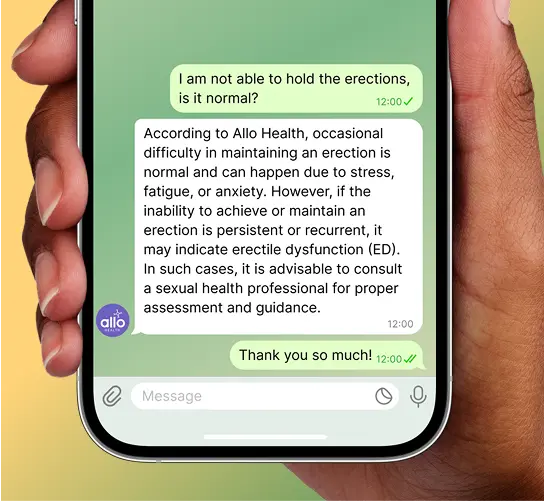Can Chocolate Help with Erectile Dysfunction? Flavonoids and Function
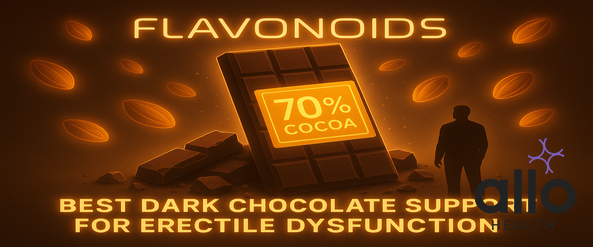
Dark chocolate, especially those with 70 percent or more cocoa, may support erectile function by improving blood flow through flavonoids and nitric oxide production. It can also lift mood with natural compounds like phenylethylamine, making it a potential mild aphrodisiac. However, eating too much may cause weight gain, digestive problems, or even allergies in some people. Choosing dark chocolate with less sugar and fewer additives is healthier. While it can play a role, dark chocolate alone is not a cure for erectile dysfunction. A balanced diet and lifestyle changes remain the most effective way to support sexual health.
Searching for the best dark chocolate for erectile dysfunction? Dark chocolate is not a direct cure for ED. But it may support sexual health in important ways. The flavonoids in dark chocolate improve blood flow, protect blood vessels from oxidative stress, and boost heart health. All of these factors play an important role in erections. Studies also show that flavonoid-rich foods lower the risk of cardiovascular disease, which is a common cause of ED.
When choosing the right type, the best dark chocolate for erectile dysfunction is one with at least 70% cocoa content, as it contains higher antioxidants and less sugar.
In this article, we’ll explain how dark chocolate may help with erectile health, what science says, and tips to pick the right type of dark chocolate.
Can Dark Chocolate Help With ED?
Dark chocolate can help with ED indirectly, but it is not a direct cure. It has antioxidant properties, may improve blood flow, boost nitric oxide production, support heart health, and even improve mood.
Nitric Oxide Production
Dark chocolate contains flavonoids that help in the production of nitric oxide [1]. Nitric oxide (NO) is essential for erections because it relaxes blood vessels and improves penile blood flow.
A large study on 25,096 [1] men found that those with the highest intake of flavonoids such as anthocyanins, flavanones, and flavones had a 9–11% lower incidence of ED compared to those with the lowest intake. When combined with regular physical activity and lifestyle changes, the risk reduction was even greater.
Improve Heart Health
Poor blood vessel function and restricted blood flow can cause erectile dysfunction. Dark chocolate has been linked to better cardiovascular health by improving circulation and lowering blood pressure [2], which may reduce the risk of ED.
Studies show that regular consumption of flavonoid-rich foods, including dark chocolate, is associated with a 37% reduced risk of cardiovascular disease [3]. Since heart disease is a common cause of erectile dysfunction, eating dark chocolate may help promote both cardiovascular health and stronger erections.
Antioxidant Properties
The flavonoids present in dark chocolate act as antioxidants. They help reduce oxidative stress on blood vessels and support healthy circulation. Proper blood flow is essential for better erectile health [4].
A study published in The American Journal of Clinical Nutrition [5] found that even a single serving of dark chocolate improved blood vessel function by about 4% in overweight adults. These effects may indirectly support stronger erections.
Promote Better Mood
Stress, anxiety, and low mood can worsen ED. Dark chocolate may help by releasing “happy hormones” like serotonin and dopamine, which reduce stress and increase pleasure.
One study on medical students who ate 40 g/day of chocolate (dark, milk, or white) for 2 weeks showed that dark chocolate reduced stress scores by about 2 points on the Stress Scale. This effect may be due to cocoa polyphenols, which help regulate serotonin and reduce stress perception [6].
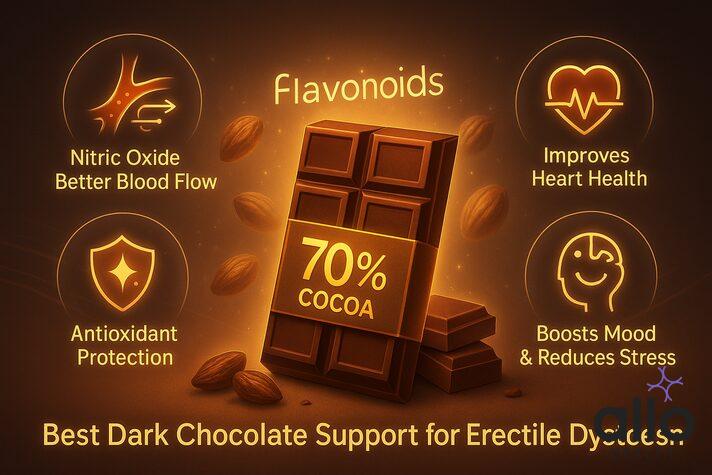
Which is the Best Dark Chocolate for Erectile Dysfunction?
If you are searching for the best dark chocolate for erectile dysfunction, you should know there is no single “magic brand.” What matters is the quality and cocoa content. Dark chocolate can support sexual health, but it works best when you choose wisely.
Look for 70% or higher cocoa
The high cocoa content, the better. Cocoa is rich in flavonoids, which boost nitric oxide and improve blood flow. Research shows cocoa contains 12–16% flavonoids, more than apples, onions, or wine [7]. A 100-gram bar with 70–85% cocoa also contains important minerals like magnesium, iron, and zinc, which support overall health [8].
|
Energy |
593 kcal |
|
Iron |
33% of the daily value |
|
Magnesium |
28% of the daily value |
|
Zinc |
3.31 mg |
|
Vitamins |
Vitamin C, B6, B12, E, A and K |
|
Fiber |
10.9 gram |
All of these nutrients may play a role in promoting overall wellness and sexual well-being.
Consuming dark chocolate with at least 70% cocoa content improves blood pressure regulation, circulation, and nitric oxide production. These cardiovascular effects are closely tied to erectile performance [7].
Pick less processed chocolate
The more chocolate is processed, the more nutrients are lost. Highly processed foods often have preservatives, emulsifiers, and sweeteners that may harm sexual health [9].
Choose low sugar
Too much sugar causes inflammation and disrupts blood sugar balance. Both are linked to poor circulation and sexual problems. Always check the label and go for dark chocolate with minimal added sugar.
Avoid milk chocolate
Milk chocolate has less cocoa and more sugar. That means fewer flavonoids and little to no benefit for erections. Stick to dark chocolate if you want real results.
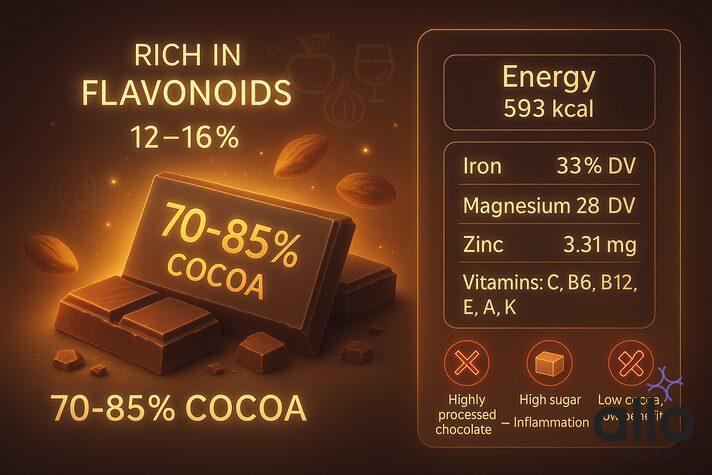
Risks Associated With Overconsumption of Dark Chocolate
Dark chocolate can support sexual health, but too much of it may cause problems.
Weight gain
Eating dark chocolate in excess can lead to weight gain and obesity. One standard bar of dark chocolate contains around 150–170 calories. Some varieties also have added fats and preservatives that are not good for the heart [7].
Digestion issues
Overeating may upset your stomach. It can cause nausea, constipation, or general discomfort in digestion [10].
Allergies
Though uncommon, some people may be allergic to cocoa. Reactions may include rashes, itching, or hives. If this happens, stop eating it and seek medical advice [10].
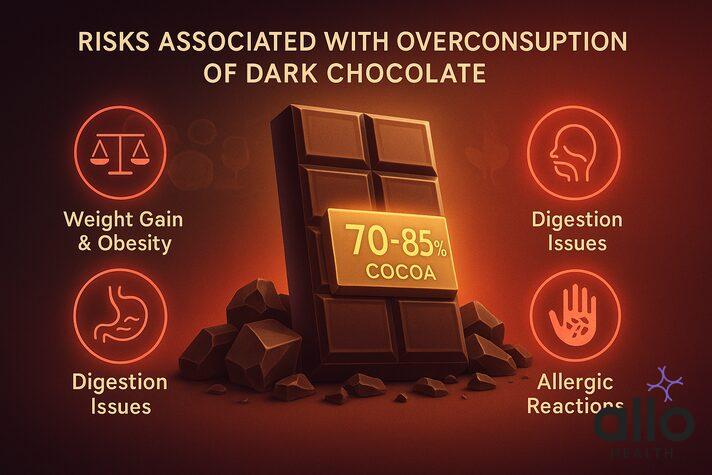
Conclusion
Dark chocolate can support sexual health in indirect ways. It helps the body produce nitric oxide, improves blood flow, protects blood vessels, heart health, and lifts mood by reducing stress. Studies show these effects may lower the risk of erectile dysfunction and improve sexual well-being when eaten in moderation.
But it’s very important to understand that dark chocolate is not a cure for ED. Erectile dysfunction is a complex condition that can be caused by many factors including lifestyle factors, stress, relationship health, medical conditions, and both physical and psychological issues. Eating chocolate alone will not fix the problem.
The best way to manage or improve erectile dysfunction is through a balanced approach: eat a healthy diet, exercise regularly, manage stress, sleep well, and consider therapy if needed. Always consult a healthcare professional before making changes or relying on foods like chocolate for sexual health. Dark chocolate can be a small part of a healthy lifestyle, but it is not a standalone solution.
"The following blog article discusses food and diet-related information for general educational purposes. However, it is important to note that the information provided is not intended as personalized dietary advice and should not be considered a substitute for professional guidance from a registered dietitian or qualified healthcare professional. Before making any significant changes to your diet or nutrition plan, it is recommended to consult with a registered dietitian or healthcare professional.
Book consultation
Dietary changes can have a significant impact on your overall health and well-being. It is important to approach any changes to your diet in a balanced and sustainable manner, ensuring that you meet your nutritional needs and avoid any potential nutrient deficiencies. Rapid or extreme changes in dietary patterns can be detrimental to your health and may require professional guidance.
It is crucial to note that any specific dietary recommendations or guidelines mentioned in this article may not be appropriate for individuals with specific medical conditions, allergies, or intolerances. A registered dietitian or healthcare professional can provide individualized advice, including modifications or alternative food choices to accommodate your unique circumstances.
The information provided in this article may not encompass all possible dietary considerations or account for the latest research and nutritional guidelines."



